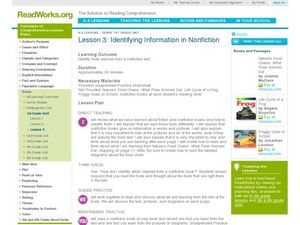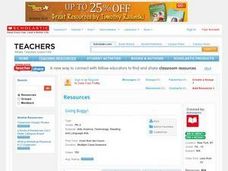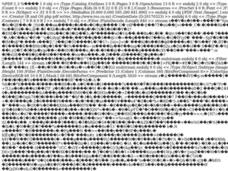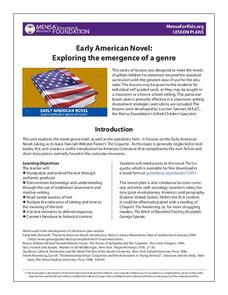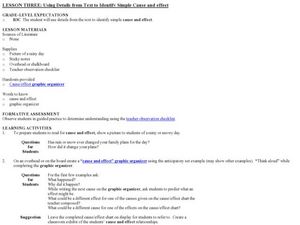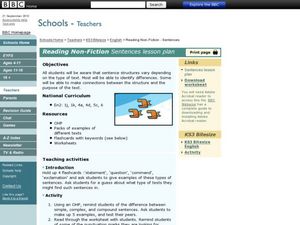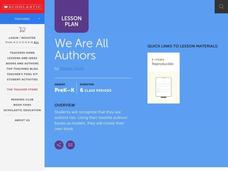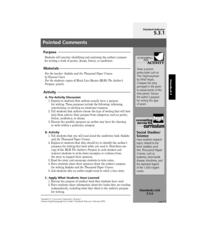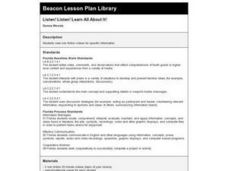Curated OER
Identifying Information in Nonfiction
Second graders investigate information in non-fiction texts. They review the features of a non-fiction text and read the book Nature's Food Chains: What Polar Animals Eat. Pupils discuss the text features and write down one fact they...
Curated OER
Introduction To Literary Analysis
Explore the fascinating ways in which authors use specific literary devices to create interesting and realistic texts. Using non-fiction articles with the subject of rogue waves, an excerpt from The Perfect Storm, by Sebastian Junger,...
Curated OER
Coming Home:From the Life of Langston Hughes
Third graders listen to the non-fiction book: COMING HOME: FROM THE LIFE OF LANGSTON HUGHES. They identify examples of metaphors and similies within the book and understand how this figure of speech is used in writing. They then create...
Curated OER
Going Buggy
Students identify the parts of a dragonfly that they drew. They write a very short non-fiction story (mainly with pictures) about the adventure of a dragonfly. They interview a person dressed as a dragonfly to find out some things about...
Curated OER
Writing A Thanksgiving Day Story
Students write a Thanksgiving story. For this holiday writing lesson, students use s list of specific words to create a fictional or non-fiction Thanksgiving story.
Curated OER
Writing Memoirs Based On A Shared Event
Students share their memories of a recent event. They use Elie Wiesel's night to help them recongize a memoir. They write a memoir about a recent school event that was shared by many. They also gather evidence that supports their version...
Curated OER
Creating and Outline From Research
Fourth graders develop 3 research questions about a topic they choose and categorize the information they have learned. In this research lesson plan, 4th graders use a variety of non fiction materials from the library.
MENSA Education & Research Foundation
Early American Novel: Exploring the Emergence of a Genre
Need an extra challenge for your best readers? Check out a unit that uses Hannah Webster Foster’s epistolary novel, The Coquette, published in 1797, as the anchor text. The resource is packed with project ideas; each with its...
Benjamin Franklin Tercentenary
The Autobiography of Benjamin Franklin
Need a model for character education? Benjamin Franklin presents himself as in a constant state of striving to become the man he hoped to be, making his autobiography is far more accessible to learners than those of people who consider...
Curated OER
Berlioz the Bear
Young children read the story, Berlioz the Bear and complete various reading and writing activities. They learn about fiction and non-fiction, and complete graphing and writing activities for the story. Youngsters draw the bear and use...
Curated OER
Using Details From The Text
Begin this expository writing activity by reading a non-fiction book of your choice and modeling expository writing. The plan suggests The Trip of a Drip by Vicki Cobb but notes that other texts will work. Learners then choose a...
Curated OER
Choosing Words Carefully
Use literacy tools to select precise vocabulary. High schoolers respond to discussion questions that require them to consider the denotation and connotation of words. They then read non-fiction passages and identify words in the passages...
Curated OER
Woody Guthrie: Life and Art
Woody Guthrie will capture the imagination of even your most reluctant learners. Using his work, your class will develop their skills in non-fiction reading comprehension, interpreting primary source material, and use of multiple forms...
Curated OER
Lesson Three: Using Details from Text to Identify Simple Cause and Effect
Third graders identify cause and effect. In this cause and effect lesson, 3rd graders use a graphic organizer to predict effects for certain causes. They read a non-fiction text and put sticky notes marking causes and effects.
Curated OER
Reading Non-Fiction Sentences
Students identify differences in types of sentences. In this sentence structure lesson, students discuss the different ways sentences are written according to their intended audience. Students create different types sentences...
Curated OER
We Are All Authors: Create a Book
Every child is an author with this engaging reading activity. First the class reviews the various parts of a book such as the title, author, dedication, and author-biography. Then each individual will choose a story of their...
Curated OER
We Are All Authors
Read and discuss a variety of books by different authors and have your class create their own book. They will identify the different parts of a book, then using a story they have already written, they enter their story and information...
Curated OER
A River Ran Wild: An Environmental History
The Nashua River serves as the focal point of an investigation of the treatment of and care for natural resources. A reading of A River Rand Wild: An Environmental History by Lynne Cherry, launches the study and class members consider...
Scholastic
Dear Miss Breed
This compelling plan based on the letters in the book Dear Miss Breed engages readers in learning what it was like for Japanese Americans following the attacks at Pearl Harbor. After reading the letters, young scholars will...
Curated OER
Pointed Comments
Fifth graders analyze pieces of writing to identify the author's purpose of writing. In this writing lesson plan, 5th graders consider a variety of pieces of writing such as, poetry, drama, fiction, and non-fiction. Each student...
Curated OER
Deduction
Young scholars investigate the linguistic devices used by writers to create meaning. In this writing lesson, students discover why writers write in different ways showing examples of different types of text. After reading each type young...
Curated OER
Listen! Listen! Learn All About It!
Fourth graders view non-fiction videos. They write questions that can be answered with information in the video. Every 10 minutes the video is stopped and the class discusses the questions.
Curated OER
Everybody Needs a Rock
Second graders examine science non-fiction books in the 500 section of the media center. They listen to Byrd Baylor's, Everybody Needs a Rock, and write a sentence that tells why everyone does need a rock. They illustrate the sentence.
Curated OER
Essential Meaning in Text Using Non-fiction Information Source
Students practice the skill of summarizing in writing the content of a passage or text and point out the main points in the story. They revise their skills on note-taking that they took the semester before and fine tune them more...
Other popular searches
- Non Fiction Writing
- Ks1 Non Fiction Writing
- Non Fiction Writing
- Non Fiction Writing Memoirs
- Non Fiction Writing Prompts
- Non Fiction Writing 2 Grade
- Non Fiction Writing Lesson
- Non Fiction Writing Frames
- Non Fiction Writing Prompts
- Creative Non Fiction Writing
- Non Fiction Writing Format
- Non Fiction Writing Process
